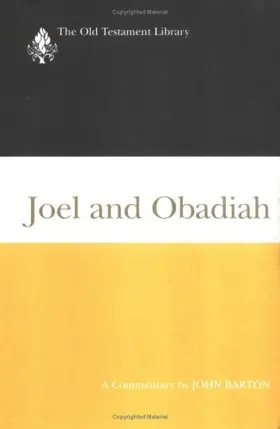

Joel and Obadiah
Pages
168
Publisher
Westminster John Knox
Published
1/1/2001
ISBN-13
9780664219666
Collections
This book appears in the following featured collections.
- Recommended OT Commentaries by Denver Seminary Journal
- Favorite Advanced OT Commentaries by Jeremy Pierce (parableman)
- TGC: Scholarly Commentaries by The Gospel Coalition
Reviews
A well-researched and insightful commentary. Longman calls it “a very well-executed historical-critical commentary. . . . Barton refuses to focus on the final form and wants to find the original setting, which will make this commentary less interesting to most, though he is an engaging writer.”
[Full Review]
The author is a wonderful interpreter of biblical texts.
By a first-rate biblical scholar.
Clear discussion of the critical and exegetical issues.
[Full Review]
Clear discussion of the critical and exegetical issues.
[Full Review]
In this volume of the well-known Old Testament Library series John Barton presents aclassical historical-critical commentary on Joel and Obadiah. Since both writings of theBook of the Twelve Prophets have many things in common (e.g., Day of YHWH,eschatological judgment of the nations), the combination of both in one volume seemsappropriate.In the introduction to Joel, Barton deals with the usual topics: canon and text (4–5), unityand structure (5–14), historical context (14–18), Joel’s role within Israelite prophecy(18–22), and theological themes (27–34). More recent developments in exegesis arereflected in the emphasis on “quotations in Joel” (22–27) and on “reading the book ofJoel as a whole” (34–36). However, in those chapters Barton summarizes more or lesscritically the work of others. Concerning the literary unity of Joel, Barton follows thosescholars who see a source-critical break before Joel 2:28 (MT 3:1). In order to highlightthe differences between the two parts, he labels the second half “Deutero-Joel.” The firstpart goes back to an oral prophecy delivered in early postexilic times, whereas Deutero-Joel stems from a significantly later period. The original Joel (1:2–2:27) called hishearers to turn to YHWH in a situation in which an extraordinary locust plaguedevastated the land.
[Full Review]
John Barton has written a concise, lucid commentary on the short, postexilic propheticbooks of Joel and Obadiah. After introductory sections covering basic critical questions,he systematically works through carefully delineated pericopes. For each unit of text,Barton presents a literal translation (based on the NRSV), appropriately selected textualnotes, and a focused commentary. His arguments and written expression throughout areclear and accessible.Taking a determinedly historical-critical approach, Barton’s tone and mode of operationare meticulously rational and circumspect. He typically surveys a variety of interpretiveoptions before presenting his own exegetical assessments. About the latter he is neverdoctrinaire. He offers regular disclaimers that his conclusions are tentative and concedesmore than once that a text’s meaning is lost to us.Barton’s decision to orient his commentary in a historical-critical direction is nowhereclearer than in his decision to bifurcate both Obadiah and Joel into earlier and laterhalves. Dividing Obadiah into verses 1–14, 15b on the one hand and verses 15a, 16–21on the other, he defends the thesis that the latter verses stem from a “Deutero-Obadiah.”He attributes its origins to a late Persian and Hellenistic tendency to tack oneschatological supplements to earlier prophetic texts.
[Full Review]



